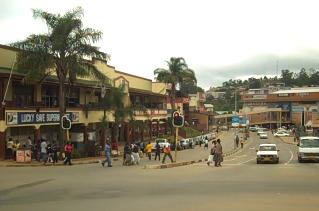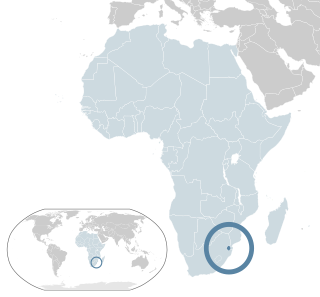
Eswatini, officially the Kingdom of Eswatini and also known as Swaziland, is a landlocked country in Southern Africa. It is bordered by Mozambique to its northeast and South Africa to its north, west and south. At no more than 200 kilometres (120 mi) north to south and 130 kilometres (81 mi) east to west, Eswatini is one of the smallest countries in Africa; despite this, its climate and topography are diverse, ranging from a cool and mountainous highveld to a hot and dry lowveld.
The economy of Eswatini is fairly diversified, with agriculture, forestry and mining accounting for about 13 percent of GDP, manufacturing representing 37 percent of GDP and services – with government services in the lead – constituting 50 percent of GDP.

Mbabane is the capital and largest city in Eswatini. With an estimated population of 94,874 (2010), it is located on the Mbabane River and its tributary the Polinjane River in the Mdzimba Mountains. It is located in the Hhohho Region, of which it is also the capital. The average elevation of the city is 1243 meters. It lies on the MR3 road.

Hhohho is a region of Eswatini, located in the north western part of Eswatini from the north and running southwards to the centre, Hhohho was named after the capital of King Mswati II, who expanded the Swazi territory to the north and west, taking in the districts of Barberton, Nelspruit, Carolina and Piet Retief. These areas were later acquired by what was the Province of Transvaal and today they form part of the Mpumalanga Province of South Africa. It has an area of 3,625.17 km², a population of 320,651 (2017), and is divided into 14 tinkhundla. The administrative center is the national capital of Mbabane. It borders Lubombo Region on the southeast and Manzini Region in the southwest.

The lilangeni is the currency of Eswatini and is subdivided into 100 cents. It is issued by the Central Bank of Eswatini. The South African rand is also accepted in the country. Similar to the Lesotho loti, there are singular and plural abbreviations, namely L and E, so where one might have an amount L1, it would be E2, E3, or E4.

The Swazi or Swati are a Bantu ethnic group of Southern Africa, predominantly inhabiting modern Eswatini and South Africa's Mpumalanga province. The Swati are part of the Nguni family that can be archaeologically traced in East Africa where the same tradition, beliefs and cultural practices are found. The Swati share a unique experience, culture and Royal lineage. This lineage is exclusive to the inhabitants of Eswatini, even though there have been more Swazi people that have moved to South Africa and the United Kingdom in the 20th century. The original inhabitants of Eswatini no longer reside in Eswatini as a majority population while some remain in the land. The Swazi people and the Kingdom of Eswatini today are named after Mswati II, who became king in 1839 after the death of his father King Sobhuza who strategically defeated the British who occupied Swaziland. The Kingdom of Swaziland was a region occupied by the San people of Southern Africa and the current Swazis came in from North Eastern regions through to Mozambique and eventually Swaziland in the 15th century. Mixtures with the San people and other Nguni tribes occurred. Their royal lineage can be traced to a chief named Dlamini I; this is still the royal clan name. About three-quarters of the clan groups are Nguni; the remainder are Sotho, Tsonga, others North East African and San descendants. These groups have intermarried freely. There are slight differences among Swazis as a nation with varying features and skin tones yet Swazi identity extends to all those with allegiance to the twin monarchs Ingwenyama "the Lion" and Indlovukati "the She-Elephant". The dominant Swati language and culture are factors that unify Swazis as a nation since there is no other language spoken except for English.

Lobamba is the traditional, spiritual, and legislative capital city of Eswatini, seat of the Parliament, and residence of the Ntombi, the Queen Mother. Mswati III lives about 10 kilometres (6.2 mi) away at the Lozitha Palace. The King and Queen Mother participate in annual December and January Incwala ceremonies and August and September Reed Dancees at the Royal Kraal.

Manzini is a city in Eswatini, which is also the capital of Eswatini's Manzini Region. The city is the country's second largest urban centre behind Mbabane, with a population of 78,000 (2008). It is known as "The Hub" of Eswatini and lies on the MR3 road. Eswatini's primary industrial site at Matsapha lies near the town's western border.
Articles related to Eswatini include:
The Central Bank of Eswatini, is the central bank of Eswatini. It was established in April 1974 and is based in capital Mbabane. According to the bank's website, the bank's mission is to promote monetary stability and foster a stable and sound financial system. Among the bank's responsibilities are managing Swaziland's foreign exchange position and safeguarding the country's foreign reserves of cash. The bank conducts weekly auctions of 91-day Swazi treasury bills, through "primary dealer" Swazi banks.The current governor is Majozi V. Sithole.
The Eswatini national cricket team represents the country of Eswatini, a country in Southern Africa, in international cricket. The Eswatini national cricket team, which is administrated by the Eswatini Cricket Association, it became an affiliate member of the International Cricket Council (ICC) in 2007. The team, along with Cameroon, the Falkland Islands and Peru was promoted to affiliate status in 2007 by the ICC. Since 2017, they became an associate member. Eswatini is also a member of the African Cricket Association. The Eswatini national cricket team would compete in the World Cricket League Africa Region and the ICC Africa Twenty20 Championship.

Lesbian, gay, bisexual, and transgender (LGBT) rights in Eswatini are limited. LGBT people face legal challenges not experienced by non-LGBT residents. According to Rock of Hope, a Swazi LGBT advocacy group, "there is no legislation recognising LGBTIs or protecting the right to a non-heterosexual orientation and gender identity and as a result LGBTI cannot be open about their orientation or gender identity for fear of rejection and discrimination". Homosexuality is illegal in Eswatini, though this law is in practice not enforced.

The following outline is provided as an overview of and topical guide to Eswatini:

Eswatini–Russia relations are the bilateral relations between the nations of Eswatini and Russia.
Prostitution in Eswatini is illegal, the anti-prostitution laws dating back to 1889, when the country Eswatini was a protectorate of South Africa. Law enforcement is inconsistent, particularly near industrial sites and military bases. Police tend to turn a blind eye to prostitution in clubs. There are periodic clamp-downs by the police.
The Eswatini Democracy Campaign consists of organisations from Eswatini and South Africa that advocate democracy in Eswatini. The campaign supports the democratic initiatives of trade unions, NGOs, student organisations and other organisations that further the cause of democratization in Eswatini. The campaign calls upon the South African government and those of other SADC countries to acknowledge that they are in effect protecting the undemocratic and repressive Eswatini regime. The campaign seeks the removal of restrictions on political parties, the news media and political gatherings, and calls for free, multi-party elections.
Eswatini is home to several languages. Native languages are Swazi, Zulu, Tsonga, Afrikaans, and English. Recent immigrant languages include Chichewa and Southern Sotho.

Eswatini–India relations refers to the international relations that exist between Eswatini and India. The High Commission of India in Maputo, Mozambique is concurrently accredited to Swaziland. India also maintain an Honorary Consulate General in Mbabane. Swaziland does not have a diplomatic mission in India.
SwaziBank, is a development finance institution, which doubles as a commercial bank in Eswatini. It is licensed and supervised by the Central Bank of Eswatini, the national banking regulator. As of March 2018 SwaziBank was the only indigenous commercial bank in the county, with the other three having their headquarters in neighboring South Africa.

Matata is a town in Eswatini.








